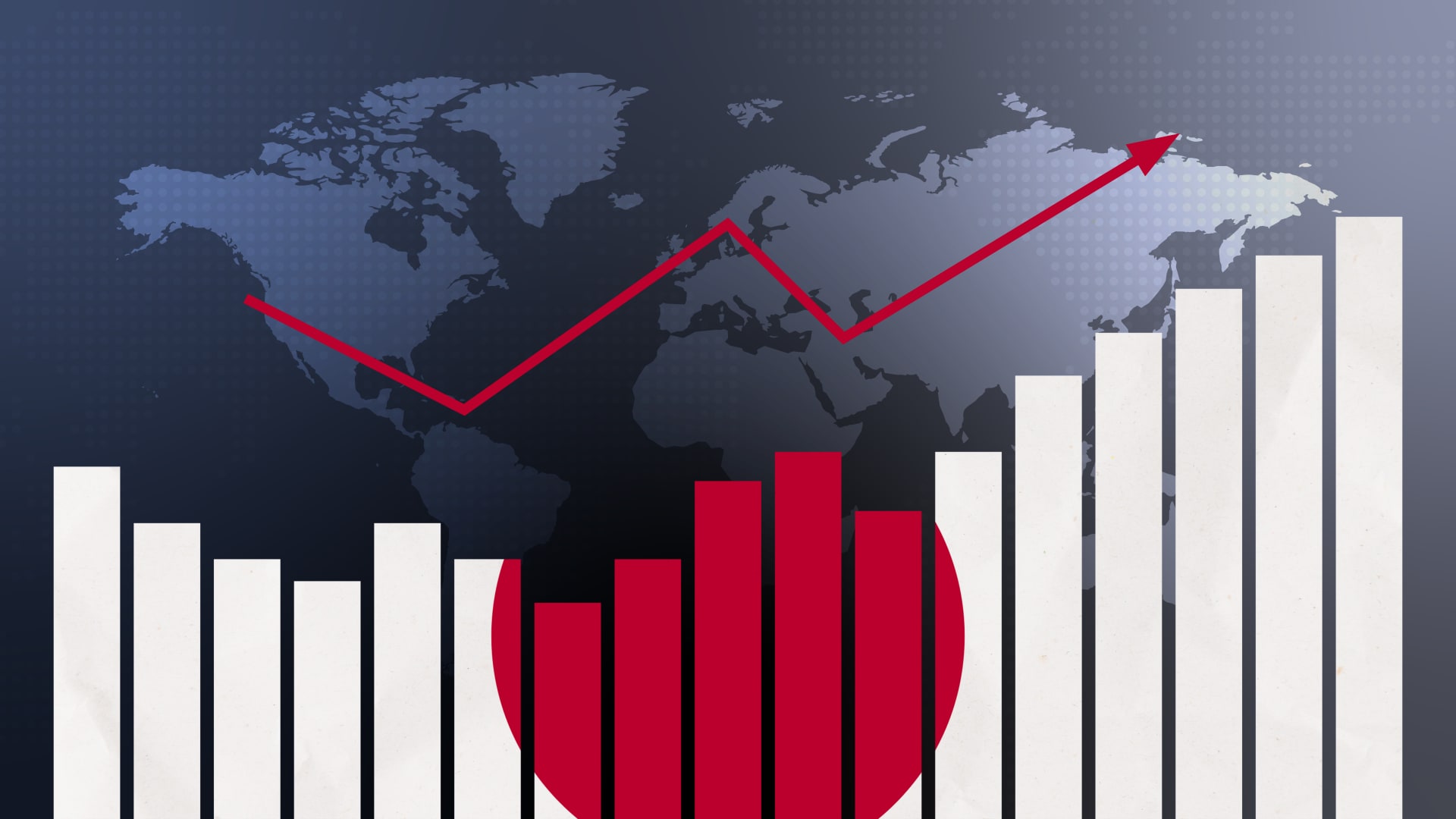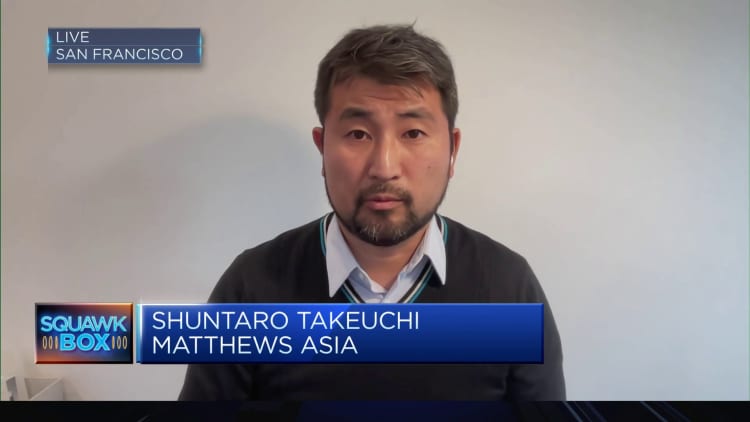
Japan bar chart graph with ups and downs, growing values, idea of financial restoration and enterprise enhancing, companies reopen, politics idea with flag
Elif Bayraktar | Istock | Getty Pictures
Hypothesis is swirling that the Financial institution of Japan might transfer to exit the world’s final detrimental charge coverage as early as subsequent week, when policymakers collect for his or her March assembly.
To be clear, most analysts anticipate Japan’s first charge hike since 2007 to happen in April after policymakers have extra proof of a significant wage improve following the “shunto” annual spring negotiations between unions and employers later this week.
“We proceed to anticipate that the BOJ will terminate NIRP in April,” Goldman Sachs economists led by Tomohiro Ota wrote in a Tuesday word, referring to the detrimental rate of interest coverage. “Whereas a March charge hike can’t be dominated out, we imagine that the BOJ’s communications at this juncture should not clear sufficient to justify assuming the March hike as the bottom case state of affairs.”
“By suspending the speed hike determination only for a month, the BOJ can acquire extra information, can get hold of a possibility to elucidate their views behind the main coverage change by means of the quarterly Financial Outlook report, and might keep away from a charge hike simply earlier than fiscal yr finish when many monetary establishments shut their books,” they added.
Whereas BOJ Governor Kazuo Ueda meets along with his different eight board members eight instances a yr, the central financial institution updates its financial outlook solely 4 instances: in January, April, July and October. The BOJ’s subsequent assembly is March 18-19.
Regardless of “core core inflation” — which excludes meals and vitality costs — exceeding its 2% goal for greater than a yr, the BOJ has barely budged from its present ultra-accommodative financial coverage posture that has been in place in 2016.
Whereas the central financial institution has successfully loosened its yield curve management coverage over long run rates of interest over the previous 16 months, it has saved rates of interest at -0.1% and nonetheless maintains an higher restrict for 10-year Japanese authorities bond yield at 1% as a reference.
The yield curve management is a coverage software the place the BOJ targets an rate of interest, after which buys and sells bonds as mandatory to attain that concentrate on.
Apart from the YCC, Japan has additionally engaged in unconventional coverage experimentation for many years with asset shopping for and quantitative easing in its bid to raise the world’s fourth-largest economic system out of deflation.
“The Financial institution of Japan has no proper to maintain financial coverage the place [they are now]. The economic system just isn’t in any form or kind to have that ultra-loose financial coverage and quantitative easing, which we’ve got been calling a significant coverage error,” Amir Anvarzadeh, a market strategist at Uneven Advisors, instructed CNBC Tuesday.
Japan, now the world’s fourth-largest economic system, narrowly prevented a technical recession in revised GDP print launched Monday, which confirmed personal consumption contracting for a 3rd quarter in a row.
Inflation blues
Excessive inflation is crimping home demand and personal consumption, underscoring the fragility of development in Japan. Non-public consumption fell 0.3% quarter on quarter — greater than the provisional estimates of a 0.2% decline, in line with the ultimate GDP information launched Monday.
In truth, it was largely resulting from power in capital expenditure that Japan managed to avert a technical recession. Nonetheless, upward revisions have been weaker than anticipated.
“Inflation in Japan is being underestimated,” stated Anvarzadeh, including that authorities subsidies — which tentatively expire in April — have saved inflation “artificially low.”
“However as soon as they do expire, inflation will probably be even greater,” he added.
Ueda has repeatedly indicated imported value pressures from excessive vitality costs within the post-Covid interval have been doubtless driving worth will increase in Japan, and he’s in search of proof of natural value pressures.
The central financial institution believes wage increments would translate right into a extra significant spiral, encouraging shoppers to spend.
“Value-push inflation is inflation, no matter what you would possibly assume. What do you assume it is in every single place else?” stated Anvarzadeh. “The massive fallacy is that within the final 20 years, it was that deflation that harm consumption.”
“Truly, deflation helped consumption in Japan as a result of wages have been stagnating, costs have been falling and thus, consumption held up. And now, wages are going up, and now inflation’s nonetheless rising forward of that and consumption has been harm,” he added.
Market repositioning
After some current hawkish feedback from BOJ officers, Japan narrowly averting a technical recession and hopes rising for sturdy wage positive factors, some market repositioning has kicked into gear as buyers brace themselves for a attainable BOJ transfer in March.
Financial institution of America’s economists on Tuesday introduced ahead their base case for a BOJ detrimental charge exit at subsequent week’s assembly, as a substitute of their earlier forecast for April — underscoring the widening schism in market views.

The rally in Japanese equities has grounded to a halt, with the yen strengthening in opposition to the greenback and 10-year Japanese authorities bond yields hitting their highest in three months Tuesday.
BOJ governor Ueda appeared to mood expectations Tuesday, placing a comparatively extra pessimistic tone on the Japanese economic system than two months in the past in feedback to Japan’s parliament.
Additionally Tuesday, Finance Minister Shunichi Suzuki stated Japan was not at a stage the place it may declare deflation as overwhelmed, Reuters reported.
‘Time is true for wage improve’
Shunto wage negotiations will end Wednesday, with the primary tally of negotiated outcomes obtainable from Friday. Japan’s greatest commerce union grouping Rengo stated employees at main corporations have requested for annual will increase of 5.85%, exceeding the 5% degree for the primary time in three many years.
In that case, that will high the greater than 3% will increase achieved final yr, which have been the most important improve in about three many years.

“In comparison with different years, [they are] far more open when it comes to elevated wages… as a result of over the previous decade, what’s noticeable is that company Japan has been raking up income and the revenue margins are already at document excessive ranges and on high of that, with the scarcity of labor itself, the time is true for wage improve,” Shuntaro Takeuchi, a Japan fund supervisor at Matthews Asia, instructed CNBC Wednesday.
“This yr, many of the corporates — a number of the corporates — are beginning to really announce extra wage hikes even greater than [5%], based mostly on some sectors. I believe they’re extra proactive than final yr, so I would not be shocked if it lands someplace between 3% and 5%,” he added.
What would an exit appear to be?
Many market individuals are wanting past the timing of BOJ’s coverage change.
“BOJ Governor Ueda stated on the press convention after the January [monetary policy meeting] that the financial coverage atmosphere will stay extraordinarily straightforward in the intervening time, implying that subsequent charge hikes can be very modest,” Goldman Sachs economists stated.
“Whether or not the BOJ mentions the long run path within the coverage assertion in a bid to restrict extreme charge hike expectations and accompanying danger of rate of interest rises, or whether or not it would solely use ambiguous language in an effort to prioritize flexibility in coverage to handle inflation dangers sooner or later will probably be essential to gauge the order of the BOJ’s financial coverage priorities,” they added.
Reuters reported that if the BOJ exits detrimental charges, it would additionally doubtless abandon the yield curve management coverage that guides the 10-year Japanese authorities bond yield at round 0% with a cap at 1%.
As an alternative, the Japanese central financial institution will doubtless supply numerical steering on how a lot authorities bonds it would buy to keep away from inflicting market disruption, Reuters reported, citing sources conversant in the matter.


